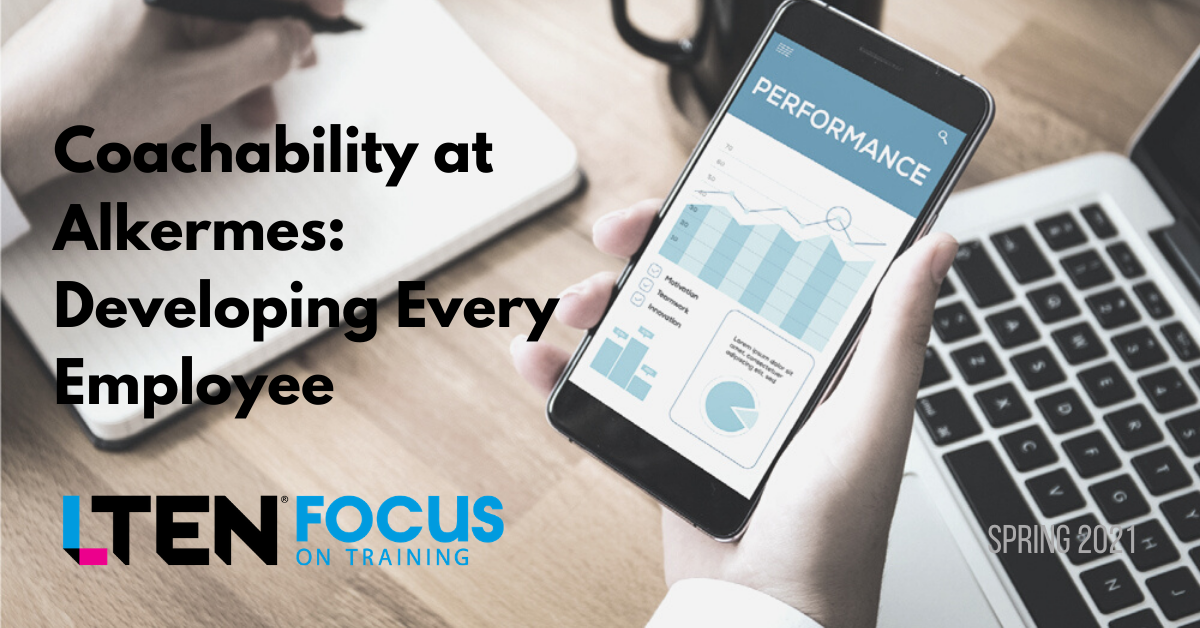
Coachability at Alkermes: Developing Every Employee
Feature Story – By Jesse Jones and Jake Weiss, Ph.D.
 Faced with our current volatile environment, the sales leadership team at Alkermes identified several key functional initiatives to drive sales force effectiveness (SFE) for the 2019-2020 year and beyond.
Faced with our current volatile environment, the sales leadership team at Alkermes identified several key functional initiatives to drive sales force effectiveness (SFE) for the 2019-2020 year and beyond.
As part of that transformation, the leadership team determined organizational coaching was the most crucial lever. However, over the past 10 to 15 years, the organization had made significant investments to elevate managers’ coaching skills, create formalized coaching approaches and improve field coaching reports (FCRs). So, putting more money on the coach did not seem like the most impactful, sustainable investment.
Internal discussions uncovered that the need was less about improving managers’ coaching skills and more about developing employees’ coachability skills. More specifically, while the leadership team believed most employees were coachable to some extent, interviews with highperforming managers indicated the major differentiator between “highquality” and “average” coaching interactions was the coachability of the employee.
To this end, leaders determined that the “missing pieces” centered on developing every employee on the salesforce to a “highly coachable” level and on creating a strong culture of coaching and coachability to ensure long-term organizational effectiveness and sustainability.
Action
The Addiction Franchise, one of two primary business units at Alkermes, took the lead with this initiative. To maximize the effectiveness of Alkermes’ coaching investments in today’s turbulent work environment, the franchise leadership team took the necessary steps to develop a strong coaching culture, which leading research indicates is critical for organizations’ current and long-term productivity, success and competitive advantage.
To this end, the Addiction Franchise implemented a comprehensive, evidence based Coachability Development Program that involved:
- Qualitative and quantitative assessments of the organizational culture to uncover whether current performance management processes and systems supported a culture of coaching and coachability.
- Development of a collaborative coaching model for the organization that defines roles, expectations and skills for the coach and coachee. This approach empowers the coachee to drive and take accountability for their own development.
- Personal coachability assessment and individualized self-report for each employee to understand their own coachability — baseline, current strengths and areas for development. (Interestingly, about 70% of employees believe they’re more coachable than their managers think they are!)
- Skill development program to elevate all employees’ coachability skills. a. We identified six coachability skills to develop over the course of a year, and selected internal company ambassadors (high-performing managers) as facilitators and trainers for the coachability skill development sessions; b. An example of skills we elevated: increasing the frequency and quality of proactively seeking constructive feedback; improving individuals’ willingness and ability to be receptive to — and accurately process — constructive or “difficult to hear” feedback; uncovering and working through sources of resistance to behavioral change (motivational, habit-based, etc.) that often hold employees back from fully implementing developmental feedback; and devising tangible strategies and plans through which to take action on constructive feedback and achieve critical business objectives.
- Sustainability plan with managers and employees to ensure pull through and transfer of learned skills and strategies and continue embedding the concept
into the fabric of Alkermes culture.
 Results
Results
We conducted blinded surveys with the field organization to measure critical improvements in effectiveness based on this comprehensive coachability development program. Post-training measurements in the Addiction Franchise at Alkermes (for 13 managers and 100 representatives) indicate the following impact:
- 78% of employees proactively seek more constructive feedback.
- 89% of employees are more accepting of, and receptive to, constructive feedback.
- 88% of employees utilize and implement the constructive feedback provided to them.
- 100% of coaching interactions are more effective.
- 78% of employees are more agile/adaptable.
- 56% of employees/districts achieved increased performance.
While these results exceeded expectations, they are not surprising given the importance of employee coachability currently being demonstrated by the emerging organizational and academic research on this topic. The sales leadership team learned that its efforts to improve the coaching interaction over the years within Alkermes previously only addressed half of the coaching equation (i.e., managers’ coaching skills). To maximize coaching practices and investments, it needed to seriously invest in developing all employees to a highly coachable level.
Based on these results, Alkermes’ internal coachability ambassadors are working to implement the coachability skills development program across the other sales franchises.
Jesse Jones is director, business operations for the Addiction Franchise at Alkermes. Email Jesse at Jesse.Jones@Alkermes.com. Jake Weiss, Ph.D., is president of Coachability Consultants. Email Jake at jake.weiss@coachabilityconsultants.com.








